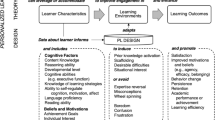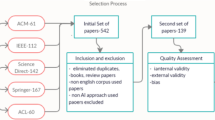Abstract
Guided notes covering lectures have been shown to improve note quality and increase scores on quizzes covering lecture material. We sought to determine whether guided notes would also be beneficial in helping students prepare for quizzes covering assigned readings. We evaluated the efficacy of guided notes for reading assignments on undergraduates’ scores on quizzes covering reading material during one semester of an Introductory Psychology course. Guided notes produced statistically significant improvements in quiz scores and note accuracy. Together with previous literature, our results suggest that guided notes may be an effective component of college courses.


Similar content being viewed by others
References
Austin, J. L., Lee, M., & Carr, J. P. (2002a). The effects of guided notes on undergraduate students’ recording of lecture content. Journal of Instructional Psychology, 31, 314–320.
Austin, J. L., Lee, M. G., Thibeault, M. D., Carr, J. E., & Bailey, J. S. (2002b). Effects of guided notes on university students’ responding and recall of information. Journal of Behavioral Education, 11, 243–254. doi:10.1023/A:1021110922552.
Barbetta, P. M., & Skaruppa, C. L. (1995). Looking for a way to improve your behavior analysis lectures? Try guided notes. The Behavior Analyst, 18, 155–160.
Bonwell, C. C. (1996). Enhancing the lecture: Revitalizing a traditional format. In T. E. Sutherland & C. C. Bonwell (Eds.), Using active learning in college classes: A range of options for faculty (pp. 31–44). San Francisco, CA: Jossey-Bass Inc.
Bonwell, C. C., & Eison, J. A. (1991). Active learning: Creating excitement in the classroom. Washington, DC: The George Washington University, School of Education and Human Development.
Buzhardt, J., & Semb, G. (2005). Integrating online instruction in a college classroom to improve cost effectiveness. Computers in Teaching, 32, 63–67. doi:10.1207/s15328023top3201_12.
Clump, M. A., Bauer, H., & Bradley, C. (2004). The extent to which psychology students read textbooks: A multiple class analysis of reading across the psychology curriculum. Journal of Instructional Psychology, 31, 227–232.
Connor-Greene, P. A. (2000). Assessing and promoting student learning: Blurring the line between teaching and testing. Teaching of Psychology, 27, 84–88. doi:10.1207/S15328023TOP2702_01.
Dunlosky, J., Rawson, K. A., Marsh, E. J., Nathan, M. J., & Willingham, D. T. (2013). Improving students’ learning with effective learning techniques: Promising directions from cognitive and educational psychology. Psychological Science in the Public Interest, 14(1), 4–58. doi:10.1177/1529100612453266.
Friedman, M. P., & Wilson, R. W. (1975). Application of unobtrusive measures to the study of textbook usage by college students. Journal of Applied Psychology, 60, 659–662. doi:10.1037/0021-9010.60.5.659.
Gazzaniga, M. S., Heatherton, T. F., & Halpern, D. F. (2016). Psychological science (5th ed.). New York: W. W. Norton & Company.
Ghasemi, A., & Zahediasl, S. (2012). Normality tests for statistical analysis: A guide for non-statisticians. Endocrinology and Metabolism, 10, 486–489. doi:10.5812/ijem.3505.
Hoyt, J. E., & Sorensen, C. T. (2001). High school preparation, placement testing, and college remediation. Journal of Developmental Education, 25, 26–33.
Indiana University East. (2015). Planning your semester. Retrieved from www.iue.edu/ucollege/advising/planningyoursemester.php.
Johnson, D. I. (2007). Using out-of-class quizzes to promote cognitive engagement. Communication Teacher, 2, 35–38. doi:10.1080/17404620701529431.
Kerkman, D. D., Kellison, K. L., Pinon, M. F., Schmidt, D., & Lewis, S. (1994). The quiz game: Writing and explaining questions improve quiz scores. Teaching of Psychology, 2, 104–106. doi:10.1207/s15328023top2102_11.
Kiewra, K. A., Benton, S., Kim, S., Risch, N., & Christensen, M. (1995). Effects of note-taking format and study technique on recall and relational performance. Contemporary Educational Psychology, 20, 172–187. doi:10.1006/ceps.1995.1011.
Konrad, M., Joseph, L. M., & Eveleigh, E. (2009). A meta-analytic review of guided notes. Education and Treatment of Children, 32, 421–444. doi:10.1353/etc.0.0066.
Marchant, G. J. (2002). Student reading of assigned articles: Will this be on the test? Teaching of Psychology, 29, 49–51. Retrieved from http://psycnet.apa.org/psycinfo/2002-04101-003.
Mawhinney, V. T., Bostow, D. E., Laws, D. R., Blumenfeld, G. J., & Hopkins, B. L. (1971). A comparison of students studying behavior produced by daily, weekly, and three-week testing schedules. Journal of Applied Behavior Analysis, 4, 257–264. doi:10.1901/jaba.1971.4-257.
McCrum-Gardner, E. (2008). Which is the correct statistical test to use? British Journal of Oral and Maxillofacial Surgery, 46, 38–41. doi:10.1016/j.bjoms.2007.09.002.
McDaniel, M. A., Wildman, K. M., & Anderson, J. L. (2012). Using quizzes to enhance summative-assessment performance in a web-based class: An experimental study. Journal of Applied Research in Memory and Cognition, 1, 18–26. doi:10.1016/j.jarmac.2011.10.001.
National Survey of Student Engagement. (2014). Bringing the institution into focus: Annual results 2014. Bloomington, IN: Indiana University Center for Postsecondary Research. Retrieved from http://nsse.indiana.edu/NSSE_2014_Results/.
Neef, N. A., Cihon, T., Kettering, T., Guld, A., Axe, J. B., Itoi, M., et al. (2007). A comparison of study session formats on attendance and quiz performance in a college course. Journal of Behavioral Education, 16, 235–249. doi:10.1007/s10864-006-9037-3.
Neef, N. A., McCord, B. E., & Ferreri, S. J. (2006). Effects of guided notes versus completed notes during lectures on college students’ quiz performance. Journal of Applied Behavior Analysis, 39, 123–130. doi:10.1901/jaba.2006.94-04.
Robin, A., Foxx, R. M., Martello, J., & Archable, C. (1977). Teaching note-taking skills to underachieving college students. The Journal of Educational Research, 71(2), 81–85. doi:10.1080/00220671.1977.10885042.
Romanik, D., & Rembowski, M. (2012). College readiness: A compendium of M-DCPS results from the Florida college placement test 2007 to 2010. Research Services. Retrieved from http://files.eric.ed.gov/fulltext/ED536241.pdf.
Ryan, C. S., & Hemmes, N. S. (2005). Effects of the contingency for homework submission on homework submission and quiz performance in a college course. Journal of Applied Behavior Analysis, 38, 79–88. doi:10.1901/jaba.2010.43-499.
Semb, G., Hopkins, B. L., & Hursh, D. E. (1973). The effects of study questions and grades on student test performance in a college course. Journal of Applied Behavior Analysis, 6, 631–642. doi:10.1901/jaba.1973.6-631.
Shadish, W. R., Cook, T. D., & Cambell, D. T. (2002). Experimental and quasi-experimental designs for generalized causal inference. Belmont, CA: Wadsworth Publishing.
University of Michigan-Flint. (2015). Surviving college. Retrieved from https://www.umflint.edu/advising/surviving_college.
Van Camp, D., & Baugh, S. (2014). You can lead a horse to water: Efficacy of and students’ perceptions of an online textbook support site. Teaching of Psychology, 41(3), 228–232. doi:10.1177/0098628314537987.
Williams, R., & Eggert, A. (2002). Notetaking predictors of test performance. Teaching of Psychology, 29, 234–237.
Acknowledgements
We would like to thank Cassandra Gonzalez, Erin Law, Erica Lozy, and James O’Neil for their help with reliability measurements. We would also like to thank Drs. Gregory Hanley, Denine Northrup, and Dave Palmer for their suggestions during the development of the project, and for their beneficial feedback on earlier versions of this paper.
Author information
Authors and Affiliations
Corresponding author
Ethics declarations
Conflict of interest
This project was completed by the first author in partial fulfillment of the requirements of the doctoral program in Behavior Analysis at Western New England University. Kathryn Glodowski declares no conflict of interest. Rachel Thompson declares no conflict of interest.
Ethical Standards
All procedures were in accordance with the ethical standards of the institutional and/or national research committee and with the 1964 Helsinki declaration and its later amendments or comparable ethical standards.
Informed Consent
Informed consent was obtained from all individual participants included in the study.
Appendices
Appendix 1: The Guided Note Covering a Reading Assignment on Psychopharmacology

Appendix 2: The Study Questionnaire Included on Each Quiz
What study strategies did you use to prepare for this quiz? |
Check all that apply: |
Highlighted/underlined important information |
Reread the assignment |
Reviewed my notes |
Made and practiced with flashcards |
Made mnemonics to help me remember |
Studied with a friend/classmate |
Practiced answering possible quiz questions |
None of these |
Other: |
Appendix 3: The Independent Note Covering a Reading Assignment on Sensation and Perception

Appendix 4: The Note Training Hand-Out Provided at the Beginning of the Guided Note Fading

Appendix 5: The Note Provided for a Health Psychology Reading Assignment During Step 2 of the Fading Procedure

Appendix 6: The Note Provided During Step 3 of the Fading Procedure

Rights and permissions
About this article
Cite this article
Glodowski, K., Thompson, R. The Effects of Guided Notes on Pre-lecture Quiz Scores in Introductory Psychology. J Behav Educ 27, 101–123 (2018). https://doi.org/10.1007/s10864-017-9274-7
Published:
Issue Date:
DOI: https://doi.org/10.1007/s10864-017-9274-7




